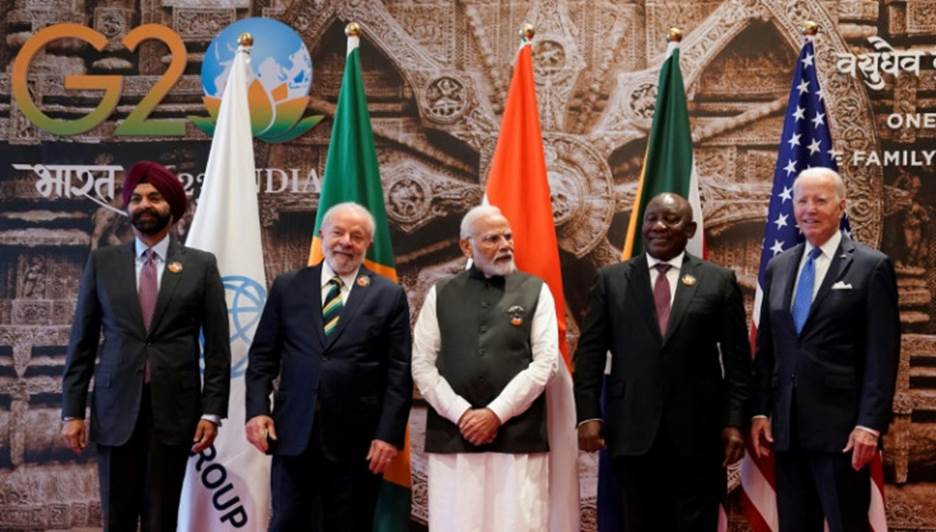
Latin Times
G20 Summit in India: Modi's Personal PR Extravaganza?
By Riaz Haq
CA

Indian Prime Minister Narendra Modi successfully transformed a routine rotational G20 presidency into an extravagant personal PR exercise this week. The Indian mass media and the general public saw Mr Modi's face plastered all over the Indian capital.
Some analysts described it as the kickoff of the Indian leader's political campaign for national elections scheduled for next year. As Mr Modi spoke of "one earth, one family, one future", his right-wing Hindutva allies continued their unhindered campaign of murder and mayhem against the Christian community in the Indian state of Manipur.
Globally, too, Mr Modi lived up to his reputation of " Divider in Chief " as the Chinese leader Xi Jinping and the Russian leader Vladimir Putin chose to stay away from the gathering attended by all the Western leaders. Both China and Russia stand in the way of the continuation of centuries-old unchallenged Western hegemony of the world.
|
|
After the Gujarat anti-Muslim pogrom of 2002, Narendra Modi made the cover of India Today magazine with the caption "Hero of Hatred". Modi was denied a visa to visit the United States. The US visa ban on Modi was lifted in 2014 after he became the prime minister of India. Since then, Narendra Modi's image has been rehabilitated by the West as the US and Western Europe seek allies in Asia to counter the rise of China. However, Modi's actions on the ground in India confirm that he remains "Hero of Hatred" and "Divider in Chief" at his core. A recent two-part BBC documentary explains this reality in significant detail. The first part focuses on the 2002 events in Gujarat when Modi as the state chief minister ordered the police to not stop the Hindu mobs murdering Muslims and burning their homes and businesses. The second part looks at the Modi government's anti-Muslim policies, including the revocation of Kashmir's autonomy (Article 370) and a new citizenship law that discriminates against Muslims. It shows the violent response by security forces to peaceful protests against the new laws and interviews the family members of people who were killed in the 2020 Delhi riots orchestrated by Modi's allies. |
In a recent piece for Nikkei Asia , Indian journalist Swaminathan Aiyar dismisses Modi's attempts to recast himself as "Vishwaguru", the teacher of the world. Here's an excerpt from Aiyar's piece titled "India's Modi is not the world's guru":
"Modi's notion of being the world's guru is just as ridiculous as his twisted history of ‘centuries of enslavement,’ which has been used to attack India's religious minorities. A guru is nothing without disciples. If India or Modi himself is the world's guru, who are the disciples? The least likely candidates are Western powers which believe, rightly or wrongly, that they are the true global gurus. It might seem that India's disciples would be most likely to come from its geographic neighborhood rather than distant lands. But even a cursory examination shows otherwise. Does Pakistan regard India as a guru? No, it is India's greatest foe. It has allied with China, India's other major foe, to try and put India in its place. No disciples there.
What about Bangladesh, which India helped to achieve independence from Pakistan in 1971? There is now little gratitude for India's help, which is accurately viewed as a ploy to split and disempower Pakistan rather than an altruistic move to aid Bangladeshis.
Sri Lanka? Many there harbor ill will toward New Delhi in the belief that it supported the development of the Tamil Tiger insurgency when Indira Gandhi was India's prime minister in the early 1980s. The insurgency became a civil war in which up to 100,000 were killed. Hard to find disciples there.
What about Nepal, a predominantly Hindu nation? Ever since then-Indian Prime Minister Jawaharlal Nehru intervened in a royal power struggle in 1951, Nepalese have viewed New Delhi as an imperial power to be feared. India has on more than one occasion blocked essential supplies to Nepal to try to exert political influence. Nepalese may be Hindus, but they are anything but Modi's disciples."
President Joseph R. Biden and other Western leaders are making a huge mistake by coddling divisive and dangerous Modi . While the western nations are seeking an alliance with India to counter rising China, the Hindutva leadership of India has no intention of confronting China. In a piece titled “America’s Bad Bet on India”, Indian-American analyst Ashley Tellis noted that the Biden administration had “overlooked India’s democratic erosion and its unhelpful foreign policy choices” in the hopes that the US can “solicit” New Delhi’s “contributions toward coalition defense”.
Earlier this year, India's External Affairs Minister S Jaishankar confirmed New Delhi's unwillingness to confront China in an interview: “Look they (China) are a bigger economy. What am I going to do? As a smaller economy, I am going to pick up a fight with bigger economy? It is not a question of being a reactionary; it is a question of common sense.”
Modi's India is driven much more by a desire to bring back what the right-wing Hindus see as the "glory days" of India through "Hindu Raj" of the entire South Asia region, including Pakistan. The arms and technology being given to Modi will more likely be used against India's smaller neighbors, not against China.
(Riaz Haq is a Silicon Valley-based Pakistani-American analyst and writer. He blogs at www.riazhaq.com )

